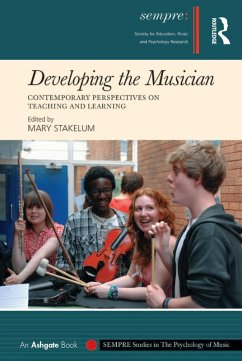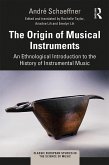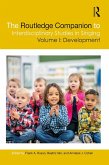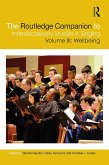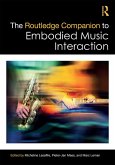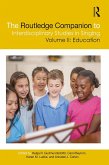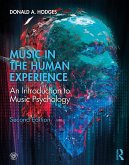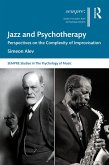Developing the Musician (eBook, PDF)
Contemporary Perspectives on Teaching and Learning
Redaktion: Stakelum, Mary
49,95 €
49,95 €
inkl. MwSt.
Sofort per Download lieferbar

25 °P sammeln
49,95 €
Als Download kaufen

49,95 €
inkl. MwSt.
Sofort per Download lieferbar

25 °P sammeln
Jetzt verschenken
Alle Infos zum eBook verschenken
49,95 €
inkl. MwSt.
Sofort per Download lieferbar
Alle Infos zum eBook verschenken

25 °P sammeln
Developing the Musician (eBook, PDF)
Contemporary Perspectives on Teaching and Learning
Redaktion: Stakelum, Mary
- Format: PDF
- Merkliste
- Auf die Merkliste
- Bewerten Bewerten
- Teilen
- Produkt teilen
- Produkterinnerung
- Produkterinnerung

Bitte loggen Sie sich zunächst in Ihr Kundenkonto ein oder registrieren Sie sich bei
bücher.de, um das eBook-Abo tolino select nutzen zu können.
Hier können Sie sich einloggen
Hier können Sie sich einloggen
Sie sind bereits eingeloggt. Klicken Sie auf 2. tolino select Abo, um fortzufahren.

Bitte loggen Sie sich zunächst in Ihr Kundenkonto ein oder registrieren Sie sich bei bücher.de, um das eBook-Abo tolino select nutzen zu können.
This book takes a fresh look at 'the musician' and what constitutes 'development' within the fields of music psychology and music education. In doing so, it explores the relationship between formative experiences and the development of the musician in a range of music education settings. It includes the perspectives of classroom teachers, popular musicians, classical musicians and educators in higher education.
- Geräte: PC
- mit Kopierschutz
- eBook Hilfe
- Größe: 2.48MB
Andere Kunden interessierten sich auch für
![The Origin of Musical Instruments (eBook, PDF) The Origin of Musical Instruments (eBook, PDF)]() André SchaeffnerThe Origin of Musical Instruments (eBook, PDF)41,95 €
André SchaeffnerThe Origin of Musical Instruments (eBook, PDF)41,95 €![The Routledge Companion to Interdisciplinary Studies in Singing, Volume I: Development (eBook, PDF) The Routledge Companion to Interdisciplinary Studies in Singing, Volume I: Development (eBook, PDF)]() The Routledge Companion to Interdisciplinary Studies in Singing, Volume I: Development (eBook, PDF)45,95 €
The Routledge Companion to Interdisciplinary Studies in Singing, Volume I: Development (eBook, PDF)45,95 €![The Routledge Companion to Interdisciplinary Studies in Singing, Volume III: Wellbeing (eBook, PDF) The Routledge Companion to Interdisciplinary Studies in Singing, Volume III: Wellbeing (eBook, PDF)]() The Routledge Companion to Interdisciplinary Studies in Singing, Volume III: Wellbeing (eBook, PDF)45,95 €
The Routledge Companion to Interdisciplinary Studies in Singing, Volume III: Wellbeing (eBook, PDF)45,95 €![The Routledge Companion to Embodied Music Interaction (eBook, PDF) The Routledge Companion to Embodied Music Interaction (eBook, PDF)]() The Routledge Companion to Embodied Music Interaction (eBook, PDF)45,95 €
The Routledge Companion to Embodied Music Interaction (eBook, PDF)45,95 €![The Routledge Companion to Interdisciplinary Studies in Singing, Volume II: Education (eBook, PDF) The Routledge Companion to Interdisciplinary Studies in Singing, Volume II: Education (eBook, PDF)]() The Routledge Companion to Interdisciplinary Studies in Singing, Volume II: Education (eBook, PDF)45,95 €
The Routledge Companion to Interdisciplinary Studies in Singing, Volume II: Education (eBook, PDF)45,95 €![Music in the Human Experience (eBook, PDF) Music in the Human Experience (eBook, PDF)]() Donald A. HodgesMusic in the Human Experience (eBook, PDF)57,95 €
Donald A. HodgesMusic in the Human Experience (eBook, PDF)57,95 €![Jazz and Psychotherapy (eBook, PDF) Jazz and Psychotherapy (eBook, PDF)]() Simeon AlevJazz and Psychotherapy (eBook, PDF)41,95 €
Simeon AlevJazz and Psychotherapy (eBook, PDF)41,95 €-
-
-
This book takes a fresh look at 'the musician' and what constitutes 'development' within the fields of music psychology and music education. In doing so, it explores the relationship between formative experiences and the development of the musician in a range of music education settings. It includes the perspectives of classroom teachers, popular musicians, classical musicians and educators in higher education.
Dieser Download kann aus rechtlichen Gründen nur mit Rechnungsadresse in A, B, BG, CY, CZ, D, DK, EW, E, FIN, F, GR, HR, H, IRL, I, LT, L, LR, M, NL, PL, P, R, S, SLO, SK ausgeliefert werden.
Produktdetails
- Produktdetails
- Verlag: Taylor & Francis eBooks
- Seitenzahl: 350
- Erscheinungstermin: 22. April 2016
- Englisch
- ISBN-13: 9781317151784
- Artikelnr.: 49364814
- Verlag: Taylor & Francis eBooks
- Seitenzahl: 350
- Erscheinungstermin: 22. April 2016
- Englisch
- ISBN-13: 9781317151784
- Artikelnr.: 49364814
- Herstellerkennzeichnung Die Herstellerinformationen sind derzeit nicht verfügbar.
Dr Mary Stakelum is an Associate Director of the Graduate School at the University of Reading and directs postgraduate research studies and MA programmes in music education at its Institute of Education. She is a board member of European Association of Music in Schools, on the editorial board of Music Education Research and conference secretary of SEMPRE.
Contents: Introduction; Part I Aspiration and Identity: Identity dimensions
and age as predictors of adult music preferences, Richard Leadbeater and
Alan Marsden; Conservatoire students' attitudes, self-efficacy and
aspirations, Marion Long; The formation and development of musical
identities with a hearing impairment, Robert Fulford; Undergraduate music
students' experiences in community settings: developing the musician within
a university module, Angeliki Triantafyllaki and Christina Anagnostopoulou;
Knowing me, knowing you, Mark Pulman; The influence of learning history on
musical approaches to piano improvisation, Yuki Morijiri; Levels of
expertise and musical aspirations in young instrumental players, Susan
Hallam. Part II Attitudes to Teaching and Learning: The MaPS project:
mapping teacher conceptions of musical development, Mary Stakelum and David
Baker; Canon (re)formation in popular music pedagogy, Tom Parkinson; Music
as a specific learning support resource for children with special
educational needs and disability in mainstream primary education: practice
and attitudes, Maureen Mather; Continuing professional development for the
musician as teacher in a university context, Elizabeth Haddon. Part III
Modes of Assessment: 'Ryan's not counting - it's eight beats on C':
developing the musician in a classroom context, Catherine Preston; Cultural
tools in the classroom - a tool to develop the musician?, Anna Backman
Bister; Exploring and encouraging metacognitive awareness in novice music
students, Meghan Bathgate and Christian Schunn; Assessing leadership skills
in the conservatoire, Tim Palmer; Music, informal learning and the
instrumental lesson: teacher and student evaluations of the Ear Playing
Project (EPP), David Baker; Index.
and age as predictors of adult music preferences, Richard Leadbeater and
Alan Marsden; Conservatoire students' attitudes, self-efficacy and
aspirations, Marion Long; The formation and development of musical
identities with a hearing impairment, Robert Fulford; Undergraduate music
students' experiences in community settings: developing the musician within
a university module, Angeliki Triantafyllaki and Christina Anagnostopoulou;
Knowing me, knowing you, Mark Pulman; The influence of learning history on
musical approaches to piano improvisation, Yuki Morijiri; Levels of
expertise and musical aspirations in young instrumental players, Susan
Hallam. Part II Attitudes to Teaching and Learning: The MaPS project:
mapping teacher conceptions of musical development, Mary Stakelum and David
Baker; Canon (re)formation in popular music pedagogy, Tom Parkinson; Music
as a specific learning support resource for children with special
educational needs and disability in mainstream primary education: practice
and attitudes, Maureen Mather; Continuing professional development for the
musician as teacher in a university context, Elizabeth Haddon. Part III
Modes of Assessment: 'Ryan's not counting - it's eight beats on C':
developing the musician in a classroom context, Catherine Preston; Cultural
tools in the classroom - a tool to develop the musician?, Anna Backman
Bister; Exploring and encouraging metacognitive awareness in novice music
students, Meghan Bathgate and Christian Schunn; Assessing leadership skills
in the conservatoire, Tim Palmer; Music, informal learning and the
instrumental lesson: teacher and student evaluations of the Ear Playing
Project (EPP), David Baker; Index.
Contents: Introduction; Part I Aspiration and Identity: Identity dimensions
and age as predictors of adult music preferences, Richard Leadbeater and
Alan Marsden; Conservatoire students' attitudes, self-efficacy and
aspirations, Marion Long; The formation and development of musical
identities with a hearing impairment, Robert Fulford; Undergraduate music
students' experiences in community settings: developing the musician within
a university module, Angeliki Triantafyllaki and Christina Anagnostopoulou;
Knowing me, knowing you, Mark Pulman; The influence of learning history on
musical approaches to piano improvisation, Yuki Morijiri; Levels of
expertise and musical aspirations in young instrumental players, Susan
Hallam. Part II Attitudes to Teaching and Learning: The MaPS project:
mapping teacher conceptions of musical development, Mary Stakelum and David
Baker; Canon (re)formation in popular music pedagogy, Tom Parkinson; Music
as a specific learning support resource for children with special
educational needs and disability in mainstream primary education: practice
and attitudes, Maureen Mather; Continuing professional development for the
musician as teacher in a university context, Elizabeth Haddon. Part III
Modes of Assessment: 'Ryan's not counting - it's eight beats on C':
developing the musician in a classroom context, Catherine Preston; Cultural
tools in the classroom - a tool to develop the musician?, Anna Backman
Bister; Exploring and encouraging metacognitive awareness in novice music
students, Meghan Bathgate and Christian Schunn; Assessing leadership skills
in the conservatoire, Tim Palmer; Music, informal learning and the
instrumental lesson: teacher and student evaluations of the Ear Playing
Project (EPP), David Baker; Index.
and age as predictors of adult music preferences, Richard Leadbeater and
Alan Marsden; Conservatoire students' attitudes, self-efficacy and
aspirations, Marion Long; The formation and development of musical
identities with a hearing impairment, Robert Fulford; Undergraduate music
students' experiences in community settings: developing the musician within
a university module, Angeliki Triantafyllaki and Christina Anagnostopoulou;
Knowing me, knowing you, Mark Pulman; The influence of learning history on
musical approaches to piano improvisation, Yuki Morijiri; Levels of
expertise and musical aspirations in young instrumental players, Susan
Hallam. Part II Attitudes to Teaching and Learning: The MaPS project:
mapping teacher conceptions of musical development, Mary Stakelum and David
Baker; Canon (re)formation in popular music pedagogy, Tom Parkinson; Music
as a specific learning support resource for children with special
educational needs and disability in mainstream primary education: practice
and attitudes, Maureen Mather; Continuing professional development for the
musician as teacher in a university context, Elizabeth Haddon. Part III
Modes of Assessment: 'Ryan's not counting - it's eight beats on C':
developing the musician in a classroom context, Catherine Preston; Cultural
tools in the classroom - a tool to develop the musician?, Anna Backman
Bister; Exploring and encouraging metacognitive awareness in novice music
students, Meghan Bathgate and Christian Schunn; Assessing leadership skills
in the conservatoire, Tim Palmer; Music, informal learning and the
instrumental lesson: teacher and student evaluations of the Ear Playing
Project (EPP), David Baker; Index.
